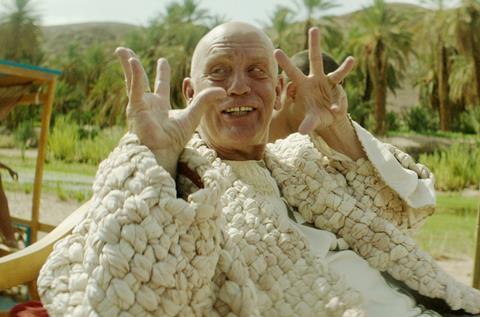John Malkovich is the posturing Roman senator in Robert Schwentke’s showboating historical drama

Dir: Robert Schwentke. Germany, Morocco. 2022. 112mins
Robert Schwentke’s showboating historical drama takes Lucius Annaeus Seneca the Younger – the Roman senator, philosopher, dramatist and wrangler-in-chief of petulant, sadistic man-child Emperor Nero – and depicts him as an insufferable, waffling blowhard. In the title role is John Malkovich, who delivers the character’s reams of dialogue as a needling, mannered torrent of words. The film mostly unfolds over the final hours of the senator’s life, when a hellish am-dram cocktail party at his estate (the film is shot in striking desert locations in Ouarzazate and Essaouira, Morocco) is interrupted by the news that Nero has decreed that he must die – either by his own hand or by that of Nero’s favoured murderous enforcer. Seneca attempts to talk himself to death, but this approach risks taking out most of the audience in collateral damage.
Numerous over-masticated performances.
Thematically, the film covers much the same territory as Schwentke’s previous, vastly superior picture, the Second World War drama The Captain. Both films depict the opportunistic abuse of power within a totalitarian system - The Captain unfolds at the ragged outlaw fringes of the war, while Seneca is set against the backdrop of Nero’s choppy stewardship of the Roman Empire. But there, the kinship with The Captain ends: this is jarring and uncommercial fare, which may find further festival slots but will likely struggle to connect with audiences elsewhere.
Seneca, as an arch and flowery narration explains, is a man who has found himself in a position of considerable power and privilege, but at immense personal cost. That cost is tallied up in the routine humiliations meted out by his boss, and in the black marks on his conscience that result from doing the bidding of the quixotic and cruel Emperor Nero. Any attempt to counsel the Emperor and recommend a more moderate path is met with an Imperial shit storm. So much wiser for Seneca to nod in appeasement, to tell the Emperor and the great and the good of Roman society what they want to hear, then go home and count his immense wealth.
But Nero, played as a tittering psychopath by Tom Xander, is easily bored. And, as his first wife Claudia, his mother Agrippina and numerous other relations and acquaintances have already discovered, Nero prefers to permanently remove anything and anyone that fails to please him.
Although Seneca’s dialogue is largely taken from his own writing, the film rejects period authenticity. Instead, the approach combines artificiality, anachronism and theatricality: a style of filmmaking that evokes the work of Terry Gilliam at his most indulgent and unfettered. It’s a film that features a lot of empty posturing, extravagant wigs, distracting set design full of stuff that is inexplicably on fire in the background, and numerous over-masticated performances.
Malkovich is by no means the only actor here who opts for a grotesquely overblown performance style, a style which is echoed by the distorting fisheye camera lens. It’s a viewing experience that is every bit as uncomfortable as Seneca’s sliced-open veins and misguided attempt to cook himself alive in a bath full of scalding water.
Production company: Filmgalerie 451
International sales: Picture Tree International pti@picturetree-international.com
Producers: Frieder Schlaich, Irene von Alberti
Screenplay: Robert Schwentke, Matthew Wilder
Cinematography: Benoît Debie
Art directors: Roman Mares, Marco Trentini, Sasa Zivkovic
Editing: Michał Czarnecki
Music: Martin Todsharow
Main cast: John Malkovich, Tom Xander, Geraldine Chaplin, Louis Hofmann, Lilith Stangenberg, Samuel Finzi, Mary-Louise Parker, Andrew Koji, Julian Sands, Alexander Fehling, Wolfram Koch, Annika Meier, Samia Chancrin
























